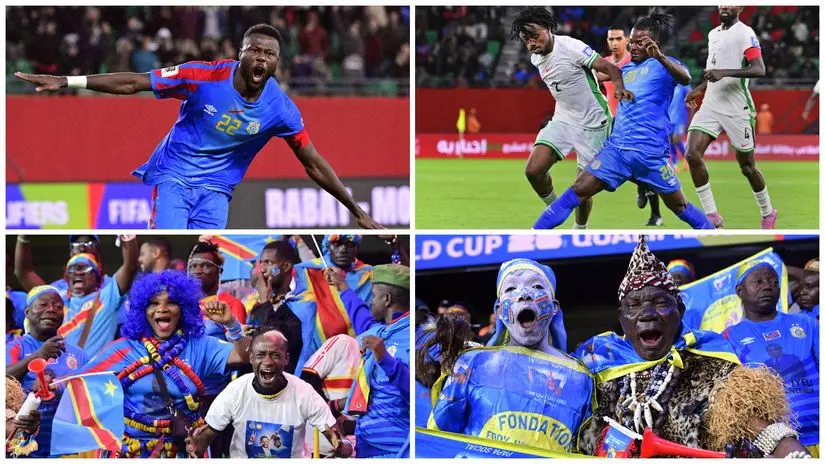In rain-soaked Rabat, the Nigeria vs DR Congo World Cup playoff delivered everything this fragile route to 2026 has promised, tension, tactical gambles, missed chances and a penalty shootout that crowned the Leopards and left the Super Eagles staring at a second straight World Cup absence.
The stakes and an unusual road to the World Cup
This was no ordinary knockout. The winners would move forward to March’s intercontinental playoff, a six-team tournament in Mexico that will decide the final two berths for the 2026 World Cup. According to the competition outline, fixtures are set for Guadalajara and Monterrey, with opponents including Bolivia, New Caledonia, Iraq, Jamaica and Panama. For Nigeria, the prize offered a route back to a stage they know well. For DR Congo, this was a chance to keep alive a return that has eluded them since 1974 when they competed as Zaire.
There was history in the air and a sense that fine margins would decide it. Nigeria carried a higher FIFA ranking and a rich World Cup pedigree, while DR Congo arrived with a defensive resilience forged by narrow wins. Few predicted how dramatically the evening would swing.
Pre-match narratives that shaped the night
Nigeria’s revival and the Osimhen factor
Nigeria’s road to Rabat was defined by recovery. A dramatic 4-1 extra-time win over Gabon put the Super Eagles into this final, with Akor Adams scoring in the 78th minute, Mario Lemina forcing extra time, then Victor Osimhen atoning for a late miss by striking twice in the additional period while Chidera Ejuke added another. That surge reflected a broader uptick, five wins in six, and 10 goals in their last three matches, a burst that restored belief just when the campaign seemed ready to unravel.
Osimhen epitomized the turnaround. He arrived on 31 international goals, six shy of Rashidi Yekini’s national record, having scored against a dozen different nations. The matchup with DR Congo carried its own sub-plot for him, a powerhouse striker still yet to find the net against the Leopards, even if previous meetings had come only in friendlies. In the end, injury would change his night, and with it Nigeria’s attacking rhythm.
DR Congo’s timely boost and a hardened edge
Across the aisle, DR Congo had been busy retooling. FIFA approved international switches for Michel-Ange Balikwisha, Mario Stroeykens and Matthieu Epolo, additions that signaled a deepening of the Leopards’ player pool. Balikwisha and Epolo were already in the squad that edged Cameroon 1-0 in the semifinal, while Stroeykens missed out due to late notification. Whether those fresh options would tip the scales was uncertain, but the mood in the camp was unmistakable, belief wrapped in stoicism.
That semifinal in itself was a statement. Captain Chancel Mbemba struck in stoppage time to beat Cameroon, another lesson in patience from a team that had stitched together three consecutive 1-0 wins. Sébastien Desabre’s men kept their shape, trusted their structure and waited for moments. Rabat would demand more of the same.
Team news and the Ndidi confusion
Team sheets often tell their own stories. In the buildup, there was confusion around Wilfred Ndidi’s availability, with some expecting a suspension for accumulated yellow cards. CAF then clarified that cautions from the qualifying group stage did not carry into the playoff tournament, which cleared the midfielder to play. The return of experienced defender Semi Ajayi after a one-match ban added another layer to Nigeria’s decision-making.
On the Congolese side, there were no fresh injuries to report after the win over Cameroon, which pointed to continuity. Pre-match chatter highlighted an unchanged rearguard and the leadership of Mbemba, with Cedric Bakambu again expected to lead the line. In a final with no safety net, cohesion was currency.
How the match unfolded in Rabat
Inside three minutes, Nigeria seized the initiative. After a defensive mix-up in the DR Congo back line, Frank Onyeka pounced to roll in the opener, the dream start that can destabilize even the most organized opponent. For a spell, the Super Eagles looked ready to add a second, but wastefulness crept in and promising deliveries skipped by without the finishing touch.
Then came the shift. Desabre turned to his bench, introducing Arthur Masuaku, Mukau and Meschack Elia, and the game’s rhythm changed. A loose ball in midfield became a springboard, Bakambu surged down the right, a deflection off Ndidi altered the path of the cutback, and Elia arrived to coolly level around the half-hour mark. Suddenly, the Leopards were playing with conviction.
The second half asked a harder question of Nigeria. Victor Osimhen was withdrawn at the interval after limping, Samuel Chukwueze later followed, then Ademola Lookman too, and with each exit the cohesion frayed. DR Congo began to force the tempo, enjoyed longer spells on the ball, and carved the clearer openings. Extra time brought tight margins and tired legs, but no breakthrough.
The penalty chess move that changed everything
At the very end of extra time, Desabre made a decision that will follow him in Congolese football lore. DR Congo replaced their starting goalkeeper Lionel Mpasi with Timothy Fayulu, a reserve brought on for one purpose. In the shootout that followed, Timothy Fayulu became the hero, saving two Nigerian penalties and shifting the entire axis of the night in a handful of seconds.
Chancel Mbemba then stepped up and sealed it with composure, the decisive kick that made it 4-3 in the shootout. The Leopards exploded into celebrations under the rain, the magnitude of the moment written on every embrace. Nigeria stood stunned, undone by missed chances, injuries and the finest of margins from twelve yards.
| CASINO | BONUS | INFO | RATING | |
|---|---|---|---|---|
|
bonus
Join VIP Club for exclusive rewards!
See 4 Bonuses
|
info
High RTP of 97%, crypto-ready payments, top providers ALSI-202410011-FI1 |
|||
|
bonus
Welcome bonuses, free spins, and cashback await you!
See 4 Bonuses
|
info
Large welcome bonus, crypto-friendly, huge provider list. No. 1668/JAZ |
|||
|
bonus
500% bonus on first 4 deposits!
See 5 Bonuses
|
info
10 crash games, mobile-first site, 500% welcome bonus BK 000678 |
|||
|
bonus
90 free spins weekly!
See 4 Bonuses
|
info
OGL/2024/137/0132 secure platform with top casino games & bonuses. |
A flashpoint on the touchline
What should have been a straightforward finale to the evening instead spilled into controversy. As DR Congo’s players celebrated, Eric Sékou Chelle confronted the Leopards’ bench and had to be restrained by his own staff and counterparts. Minutes later, he explained his anger with an allegation that quickly traveled well beyond the stadium.
During the penalties, the guy from Congo did some voodoo every time. That is why I was a little bit nervous about him. He was doing something with water.
The remarks, relayed via ESPN Africa, drew a firm line under a tense 120 minutes. Desabre waved away the incident as not an issue, preferring to keep the focus on a victory that took his team closer to a first World Cup in more than half a century. The images of the handshake line told their own story, relief on one side, raw disappointment on the other.
What the result means
For DR Congo, the road continues to Mexico in March, where the intercontinental playoff awaits. The tournament is set for Guadalajara and Monterrey, with a field that includes Bolivia and New Caledonia, and representatives from Concacaf, Asia and South America such as Jamaica, Panama and Iraq. Two of six will punch their tickets, and the Leopards are now two matches from a return last experienced in 1974.
For Nigeria, the cost is immediate and heavy. The Super Eagles will miss the World Cup for the second cycle in a row, a stark outcome for a squad loaded with talent. The night in Rabat will live long in the collective memory, from Onyeka’s early spark to the substitutions that sapped rhythm, and a shootout that slipped away in the final act. There is pride in how far they came, but also the pain of knowing how close they were.
Key numbers and moments
- Frank Onyeka struck inside the opening three minutes,
- Meschack Elia equalized around the half-hour after a Bakambu burst and a deflection off Wilfred Ndidi,
- Timothy Fayulu came on at 120 minutes and saved two penalties, before Chancel Mbemba converted the decisive kick.
Inside the tactical swings
Nigeria’s first-half pressing and direct play initially caused trouble, especially with Alex Iwobi and the wide threats of Chukwueze and Lookman. Yet without Osimhen after the break, their transitions lost bite and the final ball lacked the same menace. The congested middle third also blunted their passing lanes, and as the minutes wore on, fatigue replaced fluency.
DR Congo’s adjustments were measured. Masuaku’s introduction added thrust and balance, while Elia’s movement asked different questions of Nigeria’s back line. Bakambu’s willingness to run channels kept the Super Eagles honest, and Mbemba’s leadership steadied the group whenever momentum teetered. In a match where detail mattered, the timing of changes was crucial.
The human story behind the scoreline
Beyond systems and substitutions, there was a human pulse that matched the rain. You could see it in Onyeka’s celebration, a roar that briefly drowned the storm. You could see it in the shoulders of Nigerian players as they watched their teammates walk to the spot, each penalty a burden and a hope. And you could see it most vividly in the embrace around Chancel Mbemba, the captain who had dragged them to this final days earlier and then delivered the last word from twelve yards.
DR Congo’s bench poured onto the pitch with the final kick, the kind of joyous release that sport still gifts when fate, planning and nerve align. Nigeria’s players lingered, some bent double, some staring into the distance, the weight of a campaign settling on their backs. Nights like these are why football matters, because the stakes are unmissable and the emotions unfiltered.
Before Rabat, the signals were there
Even the buildup carried drama. Nigeria’s path had been precarious, a late surge required to reach this point, and a semifinal that demanded extra time. DR Congo had honed a habit of discipline and late winners. The head-to-head record lacked recent competitive edge, the last meeting a friendly draw in 2018, which heightened the sense that Sunday would write its own script.
Kickoff landed at 10 pm East African time, with cameras trained on the modern cauldron of the Stade Prince Héritier Moulay El Hassan. For a continent of football lovers, it was appointment viewing on SuperSport. For the players, it was the kind of evening that defines careers in a handful of actions, from a scuffed clearance to a goalkeeper’s fingertips on a spinning ball.
Where the story goes next
DR Congo now navigates the intercontinental playoff, with preparation time and the possibility of further integrating recent additions like Michel-Ange Balikwisha and Matthieu Epolo. The balance between solidity and ambition has served them well, and Fayulu’s sudden elevation offers another anchor of confidence as March approaches.
Nigeria must reset. The talent remains, the passion is undimmed, and the lessons are stark. Precision in the box, game management when momentum tilts, and depth to absorb in-game injuries will be the themes of every review. For supporters, the frustration sits alongside pride in a team that fought back into contention and lost by inches rather than miles.
The lasting image from Rabat
When the lights dim on this qualifying chapter, a few snapshots will endure. Onyeka wheeling away after the early goal. Elia’s calm finish under pressure. A soaked Fayulu soaring to his right, gloves firm and destiny humming. Mbemba striding from the spot, arms wide, as blue shirts sprint toward him. And in the shadows, a coach’s accusation about rituals and water, a reminder that football is played by people who carry their own beliefs, frustrations and coping mechanisms into moments of impossible strain.
Strip away the noise and the scoreboard tells the truth. Nigeria 1, DR Congo 1 after extra time, DR Congo 4-3 on penalties. A continent held its breath, and in Rabat the Leopards did not blink.










